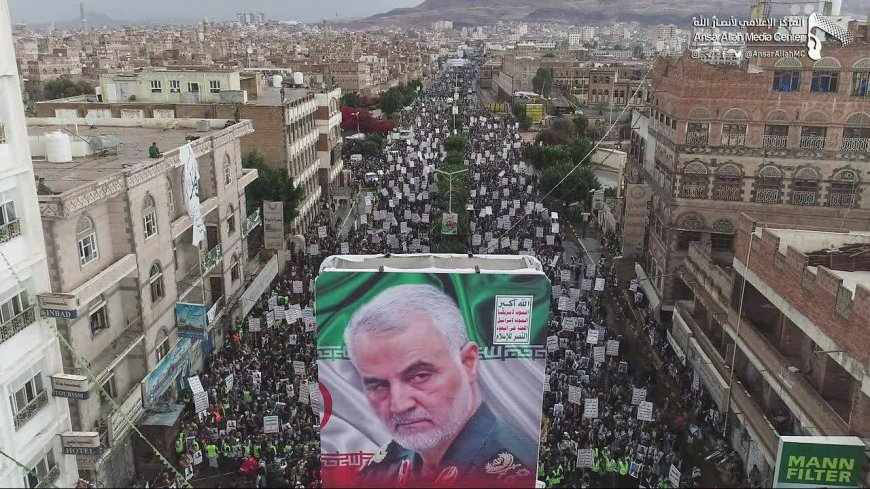General Soleimani's Martyrdom: A Catalyst for the Reinforcement of Islamic Resistance in Yemen?
The profound impact of General Soleimani's martyrdom on the people of Iran and the Islamic world in general cannot be understated. Although this tragic event sparked a sense of revenge, it is crucial to acknowledge that the blood shed by this valiant commander has served to boost the power of the Axis of Resistance. On that early morning of January 3, 2020, the United States, acting as a totally terrorist regime, perpetrated a heinous crime by assassinating the commander of the IRGC’s Quds Force, General Qasem Soleimani, alongside Abu Mahdi Al-Muhandis and their other comrades at the Baghdad International Airport.

The ramifications of this evident terrorist act have proven to be more perilous than beneficial for the United States. Driven by nefarious designs and motivated by a desire to maintain its dwindling regional hegemony, the United States sought to impede the continued victories of the resistance in the region by eliminating Haj Qasem Soleimani. However, the Americans gravely miscalculated their equations.
Contrary to the perpetrators' assumptions that the void left by General Soleimani's would be insurmountable, the developments in the region bear witness to the fact that his martyrdom not only failed to weaken the Iran-led Axis of Resistance but also served as a catalyst for its further unity and fortification. The increasing power of this formidable axis, in the wake of General Soleimani's martyrdom, has become an undeniable reality.
Among the fruits of General Soleimani's exceptional leadership and tireless endeavors was the reinforcement of the discourse of resistance in Yemen.
The Yemeni nation, which had experienced an upsurge in Islamic awakening, found itself confronted with a tragic fate when the legitimate aspirations were met with the military intervention of Saudi Arabia and its allies in 2015. Nevertheless, Saudi Arabia's relentless aggression against Yemen sparked the emergence of a resistance movement in the Arab country, centered on the Ansarullah movement. This movement has since evolved into a potent political and military player in the Middle East.
Today, Yemen's Ansarullah possesses a resolute opposition to terrorism and global US imperialism. This distinctive characteristic has transformed Yemen into one of the most significant security bastions in the Middle East over recent years. The audacious drone attacks launched by Ansarullah on Aramco facilities in September 2019, as well as their repeated strikes on the UAE, including the daring drone assault on Abu Dhabi in January 2022, attest to the fact that Ansarullah has ascended beyond a mere small revolutionary force. In fact, Ansarullah has become an influential and disruptive entity that significantly impacts the regional balance of power.
With the advent of Operation Al-Aqsa Storm in Gaza, Ansarullah's military maneuverings, including their naval engagements against the Israeli vessels in the Red Sea, have transformed into a nightmarish ordeal for both the United States and Israel.
Ansarullah's entry into the war stage has precipitated a seismic shift in power dynamics and calculations. Mere days after the Israeli regime's ground incursion into Gaza, Ansarullah swiftly retaliated by targeting Israel’s southern port of Eilat and its nuclear facilities with a barrage of ballistic missiles. Nearly six weeks into the war in Gaza, Ansarullah proclaimed its intention to seize and target Israeli vessels, as well as other ships destined for the occupied Palestinian territories, until the Israeli regime's relentless assaults on Gaza ceased.
Consequently, the adoption of this successful approach, coupled with decisive military actions, has propelled Ansarullah into a position reminiscent of Lebanon's Hezbollah after the 33-day war. As a matter of fact, the Yemenis have bolstered the power of the Axis of Resistance, recalibrated regional dynamics, and pose a formidable challenge to both the United States and the Zionist regime, along with their allies.
In conclusion, the martyrdom of General Qasem Soleimani has left an indelible mark on the world, reinvigorating the deterrence capabilities of the resistance front. The recent developments strongly indicate that Yemen's Ansarullah has emerged as a potent force in the fight against Israeli-US terrorism and regional dynamics, presenting a daunting challenge to the United States.













































